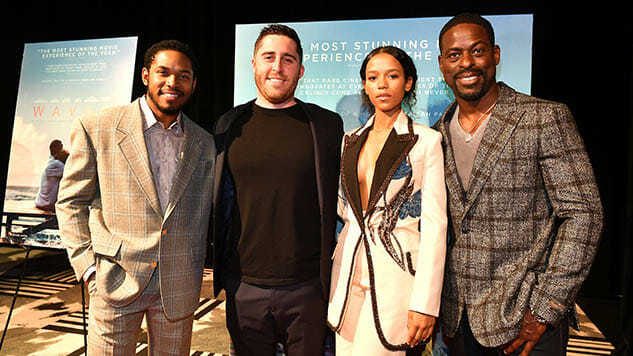Trey Edward Shults on Making Waves
Photos by Paras Griffin/Getty Images
This year, Spike Lee met defeat at the hands of a feel-good “race relations” movie: Just as Do the Right Thing wasn’t even nominated the year Bruce Beresford’s Driving Miss Daisy won Best Picture, so too did BlacKkKlansman lose to Peter Farrelly’s Green Book last February. Apart from sharing a common belief that racism can be cured through the establishment of transactional relationships between white and black Americans, both victors happen to be directed by white men.
Trey Edward Shults is a white man too, but in Waves, his third feature, he crafted the movie with his primarily black American cast. The film traces the arc of a Florida family coping with death and eventually with an altogether different but equally as terrible loss; Shults focuses first on Tyler (Kelvin Harrison Jr., who starred in Shults’s 2017 film It Comes at Night), and then, after a horrifying mid-picture development, switches perspectives to his sister, Emily (Taylor Russell). In the abstract, Waves could’ve also been about a white family, but Shults backs up his decision to shape the project around Harrison, treating him as a primary collaborator and peer, and the effort pays off.
Paste connected with Shults to talk about the work that went into identifying with a black American narrative through empathy and the simple act of listening.
(Note: This interview has been edited for clarity and length.)
Paste Magazine: As a white American, how do you approach telling the story of people of color in America?
Trey Edward Shults: Well, it happened very organically. I think It Comes at Night happened for a reason, and a huge part of that was meeting Kel. We met and loved each other and wanted to make something together again. So this was extremely collaborative. Elements of this have been brewing forever, but I hadn’t started writing anything. It didn’t all click into place. I knew the broad strokes of the story; I started telling Kel ideas for it, and he really gravitated towards Tyler. We were like “Can we make this work?” Basically we started mini-therapy sessions when I started writing, phone calls and text messages and talking about our pasts, that time of our lives, relationships with our fathers, mothers, girlfriends, school pressures, everything, and in that the commonalities and differences of being black, and Kelvin’s experiences.
I was really just trying to listen to him and collaborate and talk and try to convey that into this story. Then I wrote a draft and sent him a draft. He got it probably eight months before we started shooting, and then we just kept collaborating. We’d go through the script, analyze everything, he’d give me detailed notes, I’d go back and write more and try to make it honest and work for him. It was really beautiful because it was organic and natural, because we loved each other and wanted to work. Aspects of it were so personal to myself, but we found those commonalities in our experiences. What Kel and I talked about is making it feel authentic and real and specific to a black family while also dealing with universal things that every family can relate to in the sense of grief and love and loss and trying to heal. For myself, it’s all due to Calvin and then to the rest of the cast as they came on, and that collaboration built and grew. I tried to hear them and listen and convey everything.
Paste: How did Taylor, Renée [Elise Goldsberry] and Sterling [K. Brown] add to that collaboration? Because it sounds like, to me, what you’re discussing is very much an act of listening and letting the voices of your cast be voices in the room with you.
Shults: Oh, absolutely. I feel like the film would be nothing without them. That was everything for this. It did start with Kel, but then it built out with everyone else. I was lucky to get to work with amazing actors and see the auditions from Alexa [Demie] and Taylor; I already knew Renee and Sterling, but I got these auditions and then Skyped with them and jibed and linked with them as human beings, and connected. It started from there, with a special energy and collaboration that kept growing, and it could have been anything—text messages, phone calls, workshopping the script together. I don’t like rehearsing, but like talking about everything and getting their feedback and perspective. And then I’ll get feedback from them and write a new scene and then send it to them.
-

-

-

-

-

-

-

-

-

-

-

-

-

-

-

-

-

-

-

-

-

-

-

-

-

-

-

-

-

-

-

-

-

-

-

-

-

-

-

-








































